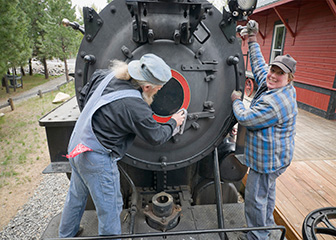What Heavy Vehicle and Mobile Equipment Service Technicians Do
About this section

Technicians inspect, repair, and replace defective or worn parts.
Heavy vehicle and mobile equipment service technicians inspect, maintain, and repair vehicles and machinery used in construction, farming, rail transportation, and other industries.
Duties
Heavy vehicle and mobile equipment service technicians typically do the following:
- Read and understand operating manuals, blueprints, and drawings
- Perform scheduled maintenance, such as cleaning and lubricating parts
- Diagnose and identify malfunctions, using computerized tools and equipment
- Inspect, repair, and replace defective or worn parts, such as bearings, pistons, and gears
- Overhaul and test major components, such as engines, hydraulics, and electrical systems
- Disassemble and reassemble heavy equipment and components
- Travel to worksites to repair large equipment, such as cranes
Heavy vehicles and mobile equipment are critical to many industrial activities, including construction and railroad transportation. Various types of equipment, such as farm machinery, cranes, and bulldozers, are used to move materials, till land, lift beams, and dig earth to pave the way for development and construction.
Heavy vehicle and mobile equipment service technicians repair and maintain engines, hydraulic systems, transmissions, and electrical systems of agricultural, industrial, construction, and rail equipment. They ensure the performance and safety of fuel lines, brakes, transmissions, and other systems.
With many types of equipment and mechanical and electrical systems, service technicians use diagnostic computers to identify problems and make adjustments or repairs. Although the use of computerized testing equipment, such as tachometers and dynamometers, is common, technicians also use many different power and machine tools, including pneumatic wrenches, lathes, and welding equipment.
Service technicians also use many different handtools, such as screwdrivers, pliers, and wrenches, to work on small parts and in hard-to-reach areas. They generally purchase these tools over the course of their careers, often investing thousands of dollars in their collections.
After locating malfunctions, service technicians repair, replace, and recalibrate components such as hydraulic pumps or spark plugs. This may involve disassembling and reassembling major equipment or making adjustments through an onboard computer program.
The following are types of heavy vehicle and mobile equipment service technicians:
Farm equipment mechanics service and repair farm equipment, such as tractors and harvesters. They also work on smaller consumer-grade lawn and garden tractors. Most mechanics work for dealer repair shops, where farmers increasingly send their equipment for maintenance.
Mobile heavy equipment mechanics repair and maintain construction and surface mining equipment, such as bulldozers, cranes, graders, and excavators. Many work for equipment wholesale and distribution shops and large construction and mining companies. Those working for the federal government may work on tanks and other military equipment.
Rail car repairers specialize in servicing railroad locomotives, subway cars, and other rolling stock. They usually work for railroad, public and private transit companies, and rail car manufacturers.
For information about technicians and mechanics who work primarily on automobiles, see the profile on automotive service technicians and mechanics.
For information about technicians who work primarily on large trucks and buses, see the profile on diesel service technicians and mechanics.
For information about technicians and mechanics who primarily work on motorboats, motorcycles and small all-terrain vehicles, see the profile on small engine mechanics.










